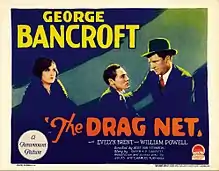The Drag Net
The Drag Net, also known as The Dragnet, is a 1928 American silent crime drama produced by Famous Players-Lasky and distributed by Paramount Pictures based on the story "Nightstick" by Oliver H.P. Garrett. It was directed by Josef von Sternberg from an original screen story and starring George Bancroft and Evelyn Brent.[1][2]
| The Drag Net | |
|---|---|
 Lobby card | |
| Directed by | Josef von Sternberg |
| Produced by | Adolph Zukor Jesse L. Lasky |
| Written by | Jules Furthman (scenario) Charles Furthman (scenario) Herman J. Mankiewicz (titles) |
| Based on | Nightstick by Oliver H. P. Garrett |
| Starring | George Bancroft Evelyn Brent |
| Cinematography | Harold Rosson |
| Edited by | Helen Lewis |
| Distributed by | Paramount Pictures |
Release date |
|
Running time | 8 reels |
| Country | United States |
| Language | Silent film (English intertitles) |
Plot
Film historian John Baxter provides a synopsis of it, a film "no longer known to exist in any archive":[7]
Captain Timothy 'Two Gun' Nolan (George Bancroft) is appointed head of the New York detective force, and as his first act, rounds up every criminal in town – the 'drag net' of the title. Gang boss 'Dapper' Frank Trent (William Powell) stands bail for all of them, including 'The Magpie' (Evelyn Brent), as independent minor gang-leader [with complex alliances]. Nolan is particularly impressed by the girl, who affects caps of black-and-white feathers, and is attended by her own bodyguard of gunmen. She and the detective have a number of sexually charged encounters before her release. Setting out to get Trent, Nolan moves in on his hideout, assisted by his friend 'Shakespeare' (Leslie Fenton). Trent, armed with a machine gun, kills Shakespeare, but makes Nolan believe it is his shot that has done so. Nolan, for motives as obscure as those which motivated the futile round-up of the gangs, resigns his commission and becomes a drunk. Found unconscious by Trent, he is offered as the pièce de résistance at a gangland banquet which 'The Magpie' attends. Pitying the humiliated man, she discovers that he did not kill his friend, reveals the fact to him, and is reformed (and wounded) in the downfall of Trent, killed by Nolan in his steel-shuttered apartment.[8]
Reception
On June 4, 1928, The New York Times panned the film: "Notwithstanding George Bancroft's derisive laugh, Evelyn Brent's striking plumed headgear and Josef von Sternberg's generous display of slaughter, The Drag Net is an emphatically mediocre effort." [9]
Critic John Baxter lists The Drag Net among a number of [Sternberg's] films which "failed commercially." [10]
– Film historian Andrew Sarris (1998)[11]
Critical response
Critic Andrew Sarris concedes that "the plot does sound extremely contrived" but cautions that "plots...are no clue to the merits of Sternberg's films, and until his long-missing film materializes, we must suspend judgment on a work that bridges The Last Command and The Docks of New York."[12]
John Baxter considers The Drag Net to be "in most respects a sequel [to Sternberg's film] Underworld, [and] is perhaps not too great a loss, though it is unwise to write off any Sternberg film."[13]
Cast
- George Bancroft - "Two-Gun" Nolan
- Evelyn Brent - "The Magpie"
- William Powell - "Dapper" Frank Trent
- Fred Kohler - 'Gabby' Steve
- Francis McDonald - "Sniper" Dawson
- Leslie Fenton - "Shakespeare"
References
- "The Dragnet". NY Times. Retrieved September 25, 2011.
- Sarris, 1966. p. 19
- The Drag Net at silentera.com database
- The American Film Institute Catalog Feature Films: 1921-30 by The American Film Institute c.1971
- The Library of Congress American Silent Feature Film Survival Catalog: The Dragnet
- The Drag Net at TheGreatStars.com; Lost Films Wanted(Wayback Machine)
- Sarris, 1966. P. 19
- Baxter, 1971. P. 53
- Baxter, 1971. P. 53-54
- Baxter, 1971. P. 53
- Sarris, 1998, p.708
- Sarris, 1966, p. 19
- Baxter, 1971. P. 53
Sources
- Baxter, John. 1971. The Cinema of Josef von Sternberg. The International Film Guide Series. A.S Barners & Company, New York.
- Sarris, Andrew. 1966. The Films of Josef von Sternberg. Museum of Modern Art/Doubleday. New York, New York.
- Sarris, Andrew. 1998. "You Ain't Heard Nothin' Yet." The American Talking Film History & Memory, 1927–1949. Oxford University Press. ISBN 0-19-513426-5